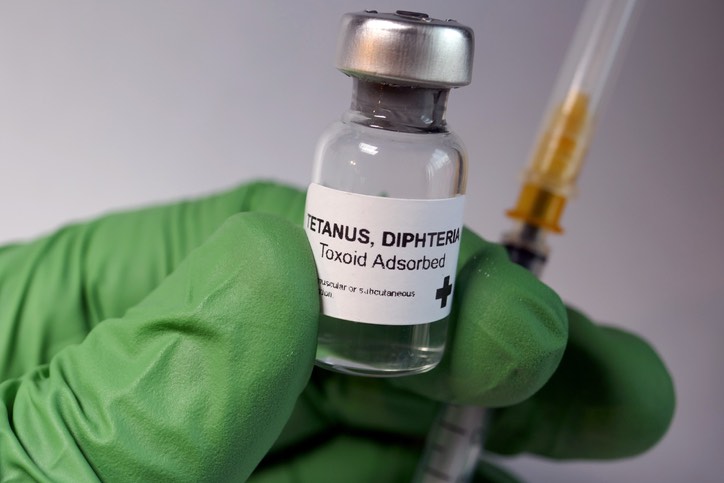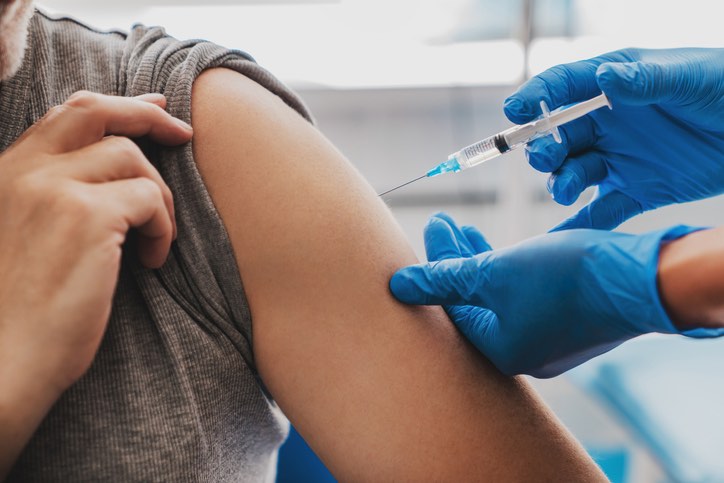Getting the TDap Vaccine During Pregnancy

The TDap vaccine is a safe and effective vaccine that provides protection against tetanus (T), diphtheria (D), and acellular pertussis (aP), more commonly known as whooping cough. It is a different vaccine from DTaP, which protects against the same three infections.
The DTap vaccine is given to infants to provide initial immunity against tetanus, diphtheria, and pertussis, whereas the TDap vaccine is a booster that became available in 2005 for adults and children over seven. The DTap vaccine is preferred for children under the age of seven because it contains stronger doses of the vaccines and thus provides a more potent immunity to these children early on.
What is Tetanus?

Tetanus is a non-communicable disease, meaning it doesn’t pass from person to person, but if contracted, it can have life-altering and even life-threatening results. The bacteria that causes tetanus lives in soil, dirt, dust, and manure, and enters the body through a skin puncture.
If left untreated, it often leads to muscle rigidity and paralysis that causes the inability to open your jaw — lock-jaw, difficulty in swallowing, and difficulty in breathing, which is fatal.
Today, because of widespread vaccination, tetanus is rare in the United States, with less than 30 cases reported annually.
What is Diphtheria?
Diphtheria is an infectious and communicable disease most commonly spread through bacteria from respiratory droplets from coughing or sneezing. Symptoms include swollen neck glands, a sore throat, weakness, mild fever, and rough, loud and difficult breathing. If left untreated, it can lead to heart failure and even death.
Outbreaks of diphtheria are rare in the United States but are still widespread in less developed nations. It can be treated with medication if caught early. Contact your physician immediately if you or your child has been exposed to someone with Diphtheria, even if you are all vaccinated.
What is Pertussis?
Pertussis, known more commonly as whooping cough, causes uncontrollable or violent coughing that can make breathing, eating, or drinking difficult. It is a common epidemic in the United States, and it is contagious.
The Pertussis vaccine protects against whooping cough. However, babies under two months are too young to receive the vaccine; therefore, immunized adults and siblings provide initial protection. Babies that are younger than 2 months also get protection through breastfeeding if the mother was vaccinated during gestation.
Unvaccinated parents, siblings, and grandparents are the primary source of whooping cough transmission to young infants. In addition, the DTaP vaccine wears off over time; therefore, older children and adults should get the TDaP booster in line with the recommended schedule.
TDap Vaccine: What You Need to Know

The TDap vaccine is administered in the upper arm, similar to the flu vaccine or COVID-19 vaccine for older children, teens, and adults. Soreness and pain at the injection site are common side effects.
The TDap vaccine is not a live vaccine; it contains inactivated tetanus toxoids, inactivated diphtheria toxoids, and acellular pertussis antigens. Therefore, the vaccine cannot cause any of the three diseases.
The two most commonly administered TDap vaccines are Boostrix and Adacel.
Common Side Effects
Similar to other vaccines, the TDap vaccine has some common side effects that may cause discomfort but are not concerning. These include
· Mild pain, redness, or swelling at the injection site
· Tiredness and fatigue
· Body aches
· Headache
· Nausea, vomiting, or diarrhea
· Mild fever
· Swelling of the arm where the vaccine was administered
Severe side effects are rare but include a high fever, an allergic reaction such as hives, difficulty breathing, dizziness, or swelling of the face and throat, and severe pain, swelling, or bleeding at the injection site.
TDap Vaccine Schedule

Per the Centers for Disease Control and Prevention (CDC), the recommended TDap immunization schedule is as follows:
· Ages 11-12, one dose
· During pregnancy, one dose per pregnancy between weeks 27-36
· For adolescents aged 13-18, one dose if you did not receive it at aged 11 or 12 and a Td or TDap booster every ten years.
Should I Get the TDap Vaccine?
If you have never received a TDaP booster, cannot remember the last time you had one, are pregnant, or know you will have close contact with an infant 12 months or younger, you should get the vaccine.
Most adults receive a Td, diphtheria, and a tetanus booster every ten years. However, there is no singular tetanus vaccine or whooping cough vaccine, so it is important to follow the CDC-recommended guidelines for receiving the DTaP and TDap vaccines. If you are unsure about getting vaccinated, speak to your healthcare provider.
Who Should Avoid the TDap Vaccine?
In most cases, the TDap vaccine is safe; however, there are a few circumstances in which you should avoid the vaccine or speak with your physician first.
The TDap is not intended for very young children; no one under seven should have the TDap vaccine.
If you are allergic to any components or have had a life-threatening allergic reaction in the past to the vaccine, do not get the booster. While severe allergic reactions are rare, they are possible. Signs of an allergic reaction are hives, shortness of breath or difficulty breathing, swelling of the mouth or tongue, rapid heart rate, and dizziness. Allergic reactions can happen within minutes but sometimes hours after the injection.
Additionally, if you experienced a seizure or a coma within seven days of receiving the DTaP, Td, or TDap vaccine as a child, avoid the booster.
If you have been diagnosed with Guillain-Barré Syndrome (GS), speak with your healthcare provider before receiving the vaccine.
To learn more about vaccine safety, visit the Food and Drug Administration (FDA) and read about the Advisory Committee on Immunization Practices.
The TDap Vaccine and Pregnancy

In most cases, it is safe and recommended to receive the TDap vaccine during pregnancy. The American College of Obstetricians and Gynecologists state that when pregnant, you should receive the TDap booster in your third trimester between weeks 27-36. It is recommended that pregnant women receive the single dose of TDap as early in that window as possible.
Pregnant people who get the booster vaccine develop vital antibodies that protect their baby during the first few months of life. Babies cannot receive their first DTaP vaccine until they are two months of age.
It takes two weeks for the immune system to produce the protective antibodies, so healthcare professionals state that postpartum vaccination is not ideal; however, it is still better than not receiving the booster.
Breastfeeding and cocooning alone are not enough to protect your baby from whooping cough. Breastfeeding can pass some protective antibodies against whooping cough; however, this is only possible if the vaccine was taken while pregnant.
These antibodies transferred through breastfeeding may not be enough to protect the child while they are yet to receive their own vaccination; therefore, all adults who will come in close contact with your child for the first few months should have the TDap vaccine.
Vaccines have become a hot topic again, particularly with the recent COVID-19 outbreak. However, it should be noted that almost all vaccinations are incredibly safe for the general population against infectious diseases. If you’re interested in information on adverse reactions reported, go to the Vaccine Adverse Event Reporting System.
TDaP has been available since 2005, and clinical trials are still conducted regularly on TDap and many other vaccines to ensure their continued safety. Ultimately the decision is yours, but the experts all agree that a TDap vaccine during pregnancy is a wise and medically supported decision.

